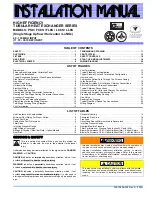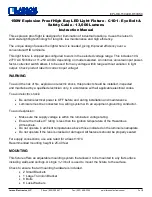
Installation and Maintenance
012-13943B
Photoelectric Effect Apparatus
7
Connect Cords and Cables
NOTE:
Before connecting any cords or cables, be sure
that all the ON/OFF switches on all parts of the
apparatus are in the OFF position.
NOTE
: The input power connectors on the power
supplies and DC Current Amplifier can be operated at
110 VAC or 220 VAC. Please make sure to select the
right setting according to your AC voltage level.
• Connect the power cord from the Mercury Light Source Enclosure into the receptacle labeled “
POWER OUTPUT FOR
MERCURY LAMP ~220V
” on the front of the Mercury Lamp Power Supply.
NOTE
: The next three cables connect the Photodiode Enclosure to the DC Current Amplifier and the Tunable DC (constant
voltage) Power Supply. These three cables will be disconnected during calibration. You do not need to turn off the power of the
DC Current Amplifier and the Tunable DC Power Supply when you disconnect and then reconnect these cables during
calibration.
• Connect the special BNC-plug-to-BNC-plug cable between the port marked “
K
” on the Photodiode Enclosure and the port
labeled “
INPUT SIGNAL
” on the DC Current Amplifier. Align the notches in the BNC plug with the tabs on the BNC port.
Push the BNC plug onto the port and twist the plug one-quarter turn clockwise to lock it onto the port.
• Connect the red banana-plug connecting cable between the port marked “
A
” on the Photodiode Enclosure and the red banana-
plug port next to the control knob marked “
-4.5V – 0VA
” on the right half of the front of the Tunable DC Power Supply.
• Connect the black banana-plug connecting cable between the port marked with the “down arrow” (symbol for GROUND) on the
Photodiode Enclosure and the black banana-plug port next to the control knob marked “
-4.5V – 0VA
” on the right half of the
front of the Tunable DC Power Supply.
Connect the power cords for the Mercury Light Source Enclosure, the DC Current Amplifier, and the Tunable DC (constant
voltage) Power Supply between the port labeled “
AC POWER CORD, 110-120V/220-240V 50Hz/60Hz
” and an appropriate
electrical outlet.
Cord and Cable Specifications
NOTE
: Replace the power cord or connecting cable with the same type.
Fuse Replacement
WARNING
: To reduce the risk of electric shock or
damage to the instrument, turn the power switch off and
disconnect the power cord before replacing a fuse.
• Disconnect the power cord from the instrument
• Open the fuse cover and remove the fuse.
• Replace the fuse(s). Use the same type fuses.
• Reconnect the power cord and turn on the instrument.
• If the problem persists, contact Technical Support for advice.
NOTE
: Replace the burned fuse with a new fuse of the same type, 250V T 2A.
Item
Specification
Power Cord
Length: 1.5 m Rating: 10A/250V
Connecting Cable
Length: 0.85 m Rating: 10A/300V








































